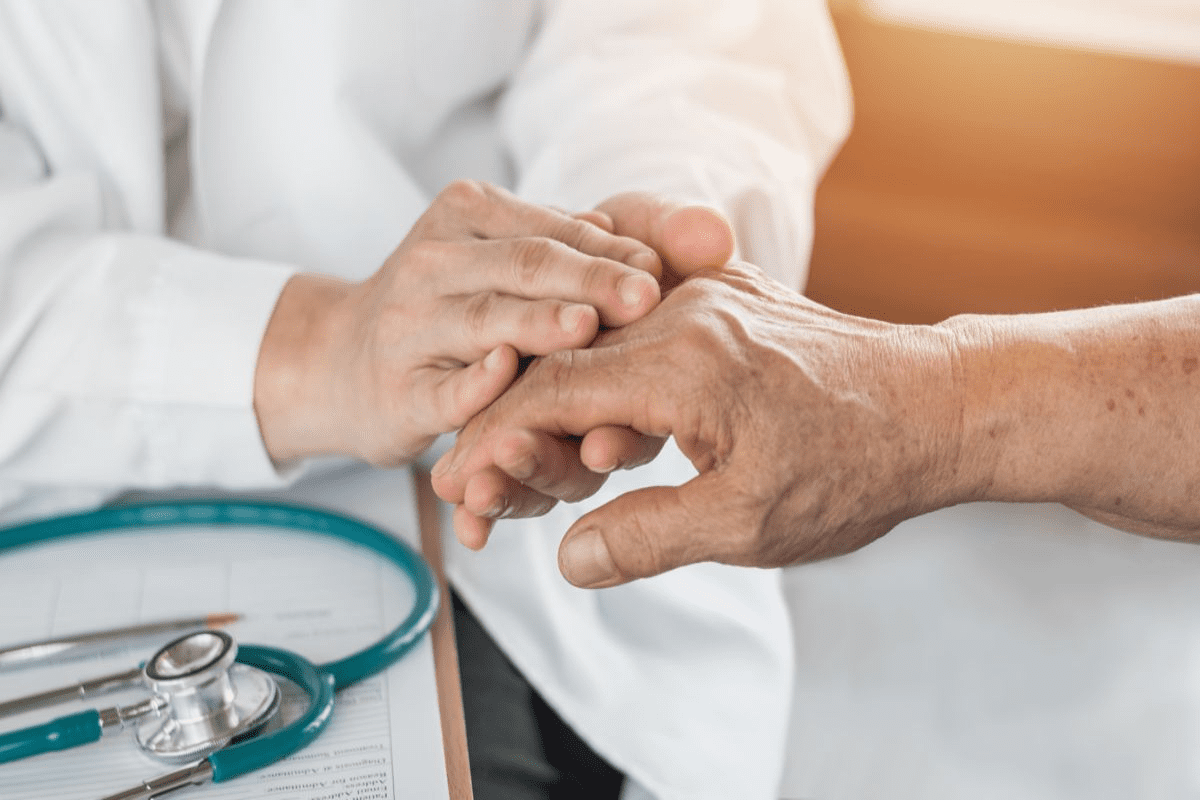Last Updated on November 27, 2025 by Bilal Hasdemir

Cancer is a big health worry for men all over the world. Early detection is key to better outcomes. At Liv Hospital, we aim to give top-notch care and help men spot cancer signs early.
Knowing the early warning signs can lead to quick medical help and better health. As a top healthcare provider, we focus on men’s health with full care.
We put our patients first and aim for the best in care. We believe teamwork can lead to better cancer detection and treatment in men.
Key Takeaways
- Early detection of cancer improves treatment outcomes.
- Liv Hospital provides complete care for men’s health.
- Spotting early symptoms is key for quick medical help.
- Our patient-focused approach helps international patients.
- Clinical excellence is at the heart of our healthcare services.
Cancer in Men: Understanding the Risks and Warning Signs
It’s key for men to know about cancer risks and signs for early detection and treatment. By looking at cancer rates in men and why early detection matters, we see why staying aware and taking health steps is important.
The Prevalence of Cancer Among Men
Cancer is a big health issue for men all over the world. Men are more likely to get certain cancers like lung, prostate, and colorectal cancer. Factors like age, family history, lifestyle, and environment play a role. Knowing these risks helps us prevent them.
Here’s a look at the most common cancers in men and how often they happen:
| Type of Cancer | Estimated Incidence Rate |
|---|---|
| Prostate Cancer | 1 in 8 men |
| Lung Cancer | 1 in 15 men |
| Colorectal Cancer | 1 in 23 men |
Why Early Detection Is Critical
Finding cancer early makes treatment work better and survival chances higher. Regular check-ups and self-exams help spot unusual signs or body changes. Being proactive can lower the risk of cancer getting worse.
Men should talk to their doctors about their risk and when to get screened. Knowing about cancer risks and signs lets men take control of their health and make smart choices for their well-being.
Common Symptoms of Cancer in Men: An Overview
Knowing the early signs of cancer is key to better treatment for men. We’ll look at how cancer symptoms show up in men. We’ll also stress the need for regular self-checks.
Typical Presentation of Cancer Symptoms in Males
Cancer symptoms in men can be tricky and varied. They often look like less serious issues. Common signs include unexplained weight loss, constant tiredness, and unusual lumps or swelling. These can point to cancers like lung, prostate, or colorectal.
It’s vital to notice any changes in how your body works or feels. For example, odd changes in urination or bowel habits, trouble swallowing, or ongoing pain are red flags. We’ll dive into these symptoms later. But remember, catching cancer early is critical for effective treatment.
The Importance of Regular Self-Examinations
Regular self-checks are essential for catching cancer early. By getting to know their bodies, men can spot unusual changes or issues that need a doctor’s look.
Self-checks should include feeling for lumps, watching for skin changes, and noticing any unusual bleeding. It’s also key to keep an eye on your overall health and tell a doctor about any lasting or severe symptoms.
| Symptom | Possible Cancer Type | Action |
|---|---|---|
| Unexplained Weight Loss | Lung, Pancreatic | Consult a doctor |
| Abnormal Lumps | Testicular, Prostate | Schedule a check-up |
| Changes in Urination | Prostate | Seek medical advice |
By staying proactive and informed about health, men can greatly boost their chances of catching cancer early. We urge regular self-checks and quick doctor visits if you notice anything odd.
Symptom #1: Unexplained Weight Loss
Unexplained weight loss is a symptom men should watch out for. It can be an early sign of cancer. We often think of weight loss as a good thing, but without a reason, it’s a worry.
Weight loss of more than 5% of body weight in six months or less is serious. It can mean there’s a health problem, like cancer.
When Weight Loss Becomes Concerning
Weight loss is a worry if it happens fast and without diet or exercise changes. If you’re losing weight without trying, finding the cause is key. Look at changes in appetite, metabolism, or how well your body absorbs nutrients.
Other health issues like thyroid problems, diabetes, and stomach diseases can also cause weight loss. But if these are ruled out and weight loss continues, cancer might be the reason.
Associated Cancer Types
Unexplained weight loss can be linked to several cancers, including:
- Pancreatic cancer: Often found late, pancreatic cancer can cause a lot of weight loss. This is because the tumor affects digestion and metabolism.
- Lung cancer: Weight loss is common in lung cancer, more so in advanced stages.
- Stomach cancer: Known as gastric cancer, it can lead to weight loss. This is because eating and digesting food becomes hard.
- Esophageal cancer: This cancer can cause weight loss. It’s because the esophagus narrows, making it hard to swallow.
Men who lose weight without reason should see a doctor. Finding out why early can help a lot with treatment.
Symptom #2: Persistent Fatigue and Weakness
Feeling tired is normal, but persistent and unexplained tiredness might mean something serious. We often think of cancer as having big symptoms. But, persistent fatigue is a common sign in men that could mean a serious health problem.
Distinguishing Cancer-Related Fatigue
Cancer-related fatigue is not just feeling tired from daily tasks. It’s a deep, lasting exhaustion that doesn’t get better with rest. Men feeling this way might feel weak, lack energy, and have trouble focusing. Unlike regular tiredness, this kind of fatigue makes it hard to do daily activities.
- Persistent: Lasts for a long time and doesn’t get better with rest.
- Unrelenting: Doesn’t get better with sleep or rest.
- Interferes with daily life: Affects doing daily tasks and keeping up with usual routines.
When Tiredness Signals Something Serious
It’s important to know when tiredness could mean something serious, like cancer. If you’re tired all the time and also have unexplained weight loss or pain, see a doctor. Some cancers, like Hodgkin lymphoma, can cause fatigue early on.
Knowing the difference between normal tiredness and a possible cancer sign can help get an early diagnosis and treatment. We urge men to pay attention to their bodies. If you’re tired all the time and it doesn’t get better with rest, get medical help.
Symptom #3: Abnormal Lumps and Swelling
Men should watch out for abnormal lumps or swelling. These signs can mean different health problems, like cancer. Spotting new or changing lumps early is key to better treatment.
What Do Cancer Lumps Feel Like in Men
Cancer lumps are often hard, painless, and fixed in place. They don’t move when you touch them. But, not all hard lumps are cancer. A doctor’s check is needed to know for sure.
- Hardness: Cancer lumps are usually hard.
- Pain: They are often painless, at least in the early stages.
- Mobility: Cancerous lumps are usually fixed and do not move under the skin.
Common Locations for Cancerous Lumps
Cancerous lumps can show up in many places. Some common spots include:
- Testicles: Testicular cancer often presents as a painless lump or swelling in the testicle.
- Lymph Nodes: Swollen lymph nodes can be a sign of lymphoma or other cancers that have spread.
- Breast Tissue: Men can get breast cancer, showing up as a lump.
- Soft Tissues: Sarcomas can occur in the soft tissues, including fat, muscle, and blood vessels.
Knowing where and what these lumps look like can help men spot them early. If you see anything odd, see a doctor right away.
Symptoms #4-6: Changes in Bathroom Habits
We often overlook changes in our bathroom habits, but they can be critical signs of serious health problems. These changes can show up in different ways. They include changes in urination, bowel movements, or unexplained bleeding.
Urinary Changes and Prostate Cancer
Urinary changes are a big concern, mainly for men. They can be an early sign of prostate cancer. Symptoms include:
- Difficulty starting or stopping the flow of urine
- Frequent urination, often at night
- Weak or interrupted flow of urine
- Pain or burning during urination
These signs can point to an enlarged prostate or other prostate problems. They might need medical attention.
Bowel Changes and Colorectal Cancer
Changes in bowel habits can also signal health issues, like colorectal cancer. Look out for:
- Diarrhea or constipation that lasts
- Narrowing of the stool
- Blood in or on the stool
- Urgency to have a bowel movement
These changes might be small, but if they keep happening, see a doctor.
Unexplained Bleeding
Unexplained bleeding during urination or bowel movements is a warning sign. Bleeding can be a sign of cancer, among other things. For example, blood in the urine might mean bladder or kidney cancer. Rectal bleeding could be a sign of colorectal cancer.
It’s important to notice these changes and talk to a healthcare professional. Catching these issues early can greatly improve treatment chances for many cancers.
Symptoms #7-9: Respiratory and Oral Warning Signs
Respiratory and oral symptoms are key to catching cancers early. They can signal serious health issues, including cancer. We’ll look at three important symptoms: chronic cough, difficulty swallowing, and persistent hoarseness or voice changes.
Chronic Cough and Lung Cancer
A chronic cough is a common lung cancer symptom. If your cough lasts more than a few weeks, see a doctor. This cough can be dry or produce mucus, and sometimes it may include coughing up blood or rust-colored mucus.
Experts say a chronic cough is often an early lung cancer sign. “A persistent cough that doesn’t go away should be evaluated by a doctor, specially if you’re a smoker or have a history of smoking,” advises an oncology specialist.
| Symptom | Possible Cancer Association | Action |
|---|---|---|
| Chronic Cough | Lung Cancer | Consult a doctor if it persists |
| Difficulty Swallowing | Esophageal or Throat Cancer | Seek medical evaluation |
| Hoarseness or Voice Changes | Laryngeal Cancer | Visit an ENT specialist |
Difficulty Swallowing
Difficulty swallowing, or dysphagia, can signal esophageal or throat cancer. It happens when there’s a blockage or narrowing in the esophagus. This makes it hard to swallow food or liquids. If you have this symptom, get medical help right away.
For more information on cancer warning signs, visit our page on the 7 warning signs of.
Persistent Hoarseness or Voice Changes
Hoarseness or voice changes lasting more than a few weeks can be a sign of laryngeal cancer. This happens when a tumor affects the vocal cords, changing the voice. If you notice persistent changes, see an ear, nose, and throat (ENT) specialist.
Spotting these symptoms early can greatly improve health outcomes. We urge you to watch your health closely and seek medical advice if you notice any of these respiratory and oral warning signs.
Symptoms #10-12: Additional Early Signs You Shouldn’t Ignore
Many symptoms of cancer are well-known. But, night sweats and chronic pain can also signal the disease. Knowing these signs can help men get medical help quickly.
Night Sweats and Unexplained Fever
Night sweats can mean certain cancers, like lymphoma. An unexplained fever can also be a sign. Cancer can mess with the body’s immune system and how it regulates temperature.
It’s important to tell if night sweats or fevers are from cancer or other issues. If you keep getting night sweats or fevers without a reason, see a doctor.
“Cancer can cause a range of systemic symptoms, including night sweats and fever, due to its impact on the body’s immune system.” –
Chronic Pain That Doesn’t Subside
Chronic pain that doesn’t go away can be a cancer warning. This pain can come from a tumor pressing on nerves, bones, or organs. The pain can be steady or come and go, and its strength can change.
Bone pain can mean cancer has spread to the bone, like prostate or breast cancer. Abdominal pain can be linked to various cancers in the gut.
| Type of Cancer | Common Areas of Pain |
|---|---|
| Prostate Cancer | Lower back, hips, pelvis |
| Gastrointestinal Cancers | Abdomen |
| Metastatic Cancer | Bones, spine, pelvis, ribs |
Unusual Skin Changes and Lesions
Unusual skin changes or lesions can be early cancer signs. These can include new moles, changes in existing moles, or other lesions. Skin cancer, like melanoma, can show these symptoms.
It’s key to watch your skin for any changes. If you notice anything odd, see a dermatologist. Early skin cancer detection can greatly improve treatment results.
Knowing these extra early cancer signs can help men stay healthy. If you’re experiencing any of these symptoms, get medical advice right away.
Conclusion: Taking Action for Better Health Outcomes
Early detection is key in the battle against cancer. Knowing the warning signs can save lives. Men should watch for signs like unexplained weight loss, constant tiredness, and unusual lumps.
Regular self-checks and screenings are important for men’s health and preventing cancer. At Liv Hospital, we offer top-notch healthcare for international patients. Our team is ready to help those dealing with cancer.
By staying informed and proactive, men can manage their health better. For more on cancer warning signs, check our resource page.
Acting now can lead to a healthier future. We urge everyone to focus on their health and get medical help for any odd symptoms. Together, we can fight cancer more effectively.
FAQ
What are the most common symptoms of cancer in men?
Common symptoms include unexplained weight loss and persistent fatigue. Also, look out for abnormal lumps and changes in bathroom habits. Chronic cough, difficulty swallowing, and unusual skin changes are also signs. If you notice any, see a healthcare professional.
How can I identify a cancerous lump?
Cancerous lumps are hard, painless, and fixed. If you find any unusual lumps or swelling, see a doctor. At Liv Hospital, our experts can assess and diagnose these symptoms.
What types of cancer are associated with unexplained weight loss?
Unexplained weight loss can signal pancreatic, stomach, lung, or colon cancer. If you’re losing weight without reason, get medical help.
Can persistent fatigue be a sign of cancer?
Yes, persistent fatigue can be a cancer symptom. It’s often seen in leukemia, lymphoma, and colon cancer. If you’re always tired, talk to your doctor.
How is prostate cancer related to urinary changes?
Prostate cancer can cause urinary issues like trouble starting or stopping urination. It can also lead to a weak urine flow or frequent urination. If you notice these symptoms, see a healthcare professional.
What are the signs of colorectal cancer?
Colorectal cancer can cause bowel changes like diarrhea, constipation, or blood in the stool. If you notice unusual bowel habits, get medical attention.
Can a chronic cough be a sign of lung cancer?
Yes, a chronic cough can be a lung cancer symptom. If your cough persists or gets worse, see a doctor.
What are the early signs of skin cancer?
Early signs include new moles, changes in existing moles, or lesions. Be aware of your skin and see a healthcare professional if you notice anything unusual.
How can I reduce my risk of developing cancer?
While cancer prevention is not guaranteed, a healthy lifestyle helps. Eat well, exercise regularly, and avoid tobacco. Regular check-ups and screenings can also help detect cancer early.
What should I do if I’m experiencing symptoms of cancer?
If you’re experiencing symptoms, see a healthcare professional. At Liv Hospital, our experts can diagnose and treat various cancers. Don’t hesitate to seek medical attention for unusual symptoms.
References
American Cancer Society. Finding Cancer in Young Adults. https://www.cancer.org/cancer/types/cancer-in-young-adults/finding-cancer-in-young-adults.html
PubMed Central (PMC). PMC3529287. https://pmc.ncbi.nlm.nih.gov/articles/PMC3529287/
Cancer Research UK. Cancer Symptoms. https://www.cancerresearchuk.org/about-cancer/cancer-symptoms








